unit3 Computers课文分析
- 格式:doc
- 大小:48.50 KB
- 文档页数:4
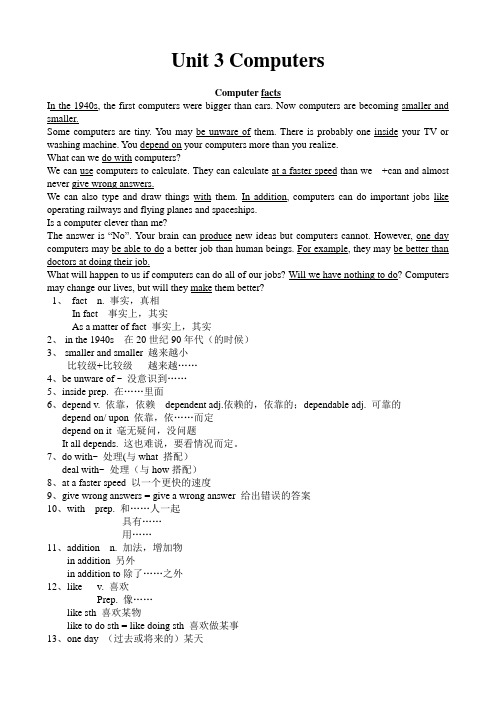
Unit 3 ComputersComputer factsIn the 1940s, the first computers were bigger than cars. Now computers are becoming smaller and smaller.Some computers are tiny. You may be unware of them. There is probably one inside your TV or washing machine. You depend on your computers more than you realize.What can we do with computers?We can use computers to calculate. They can calculate at a faster speed than we +can and almost never give wrong answers.We can also type and draw things with them. In addition, computers can do important jobs like operating railways and flying planes and spaceships.Is a computer clever than me?The answer is “No”. Your brain can produce new ideas but computers cannot. However, one day computers may be able to do a better job than human beings. For example, they may be better than doctors at doing their job.What will happen to us if computers can do all of our jobs? Will we have nothing to do? Computers may change our lives, but will they make them better?1、fact n. 事实,真相In fact 事实上,其实As a matter of fact 事实上,其实2、in the 1940s 在20世纪90年代(的时候)3、smaller and smaller 越来越小比较级+比较级越来越……4、be unware of ~ 没意识到……5、inside prep. 在……里面6、depend v. 依靠,依赖dependent adj.依赖的,依靠的;dependable adj.可靠的depend on/ upon 依靠,依……而定depend on it 毫无疑问,没问题It all depends. 这也难说,要看情况而定。

unit3Computers课文分析Unit3 Computers - Reading: Who AM I 课文分析1. Over time I have been changed quite a lot. I began as a calculating machine in France in 1642.over : _____________________ 计算机:_____________________2. Although I was young I could simplify difficult sums.用( )画出从句, 是_________________从句, 用_______________引导.simplify (1). 词性:______________ (2). 词义:_____________________sum (1). 词性:______________ (2). 词义:_____________________in sum: _____________________ sum up: _________________________3. I developed very slowly and it took nearly two hundred years before I was built as an analytical machine by Charles Babbage.(1)an analytical machine _______________________(2). It was/ took + 段时间+ before .... ____________从句常用____________时态_It will take/be long (或一段时间) before..._____________________从句常用_______ _______时态翻译句子:(1)过了三天他才回来__________________________________________________ (2)要过五年我才能回来________________________________________________ (3)两年后他才得知真相________________________________________________ (4)经济形式要等两年后才会有所好转(economic situation improves) ________________________________________________________________ _______It was not long (段时间)+before....______________________________It won't be long (段时间) + before...._______________________________(1)不久他在公司就升了职(get a rise)_______________________________________________________________ (2)用不了多久我们就会习惯新的学校(be used to +n/ ving ) _______________________________________________________________翻译句子并总结句型,并注意从句时态It is / has been ten years since he left Beijing.It is / has been ten years since he was a doctor.It was 8 o'clock when he came back.It will be midday when they get home.(3). It is/ has been +段时间+ since… _____________________________________It will be/ was + 具体时间点+ when、、、____________________________________ It is/ was + 时间状语+ that 、、、______________________________________用 A. before B. when C. since D. that填空1. It was two years ________he realized the truth.2. It will be two years ________ the economic situation improves.3. It was two years later ________ he realized the truth.4. It is /has been two years ________ he lived here.5. It was midnight ________ he arrived home.6. It was at midnight ________ he arrived home.7. It was not until midnight _______ he arrived home.4. After I was programmed by an operator who used cards with holes, I could "think" logically and produce an answer quicker than any person.用( ) 画出从句, 是_____________ 从句,引导词是_________和________________从句, 引导词是____________在从句中作_______________成分.programme: ______________________ operator: _________________________ logically: __________________________5. At that time it was considered a technological revolution and the start of my "artificial intelligence".at that time: ____________________技术革命: ______________________ 人工智能: __________________________6. In 1936 my real father, Alan Turing, wrote a book about how I could be made to work asa "universal machine" to solve any difficult mathematical problem.划线部分做___________________成分.我认为这个问题不难解决.I think _____________________________________________________.当夜幕降临时, 他们找了间小房间住宿When evening came ____________________________________________solve: ____________________ 名词形式:________________________ .......的解决办法:___________________________________7. From then on, I grew rapidly both in size and in brainpower.from then on ____________________from... on...._____________________从现在起: _______________________ 从明天起: ___________________________ brainpower: _____________________-8. By the 1940s I had grown as large as a room, and I wondered if I would grow any larger. However, this reality also worried my designers.修饰比较级的词和短语,你能写出几个: ___________________________________________________________________________________________________________ _____ 用( ) 画出从句, 是_______________从句, 从句中缺成份吗?_____________, 缺的是什么?________________9. As time went by, I was made smaller. First as a PC( personal computer) and then as a laptop, I have been used in offices and homes since the 1970s.用( ) 画出从句, 是________________从句, 引导词是_____________.意为“________________”。
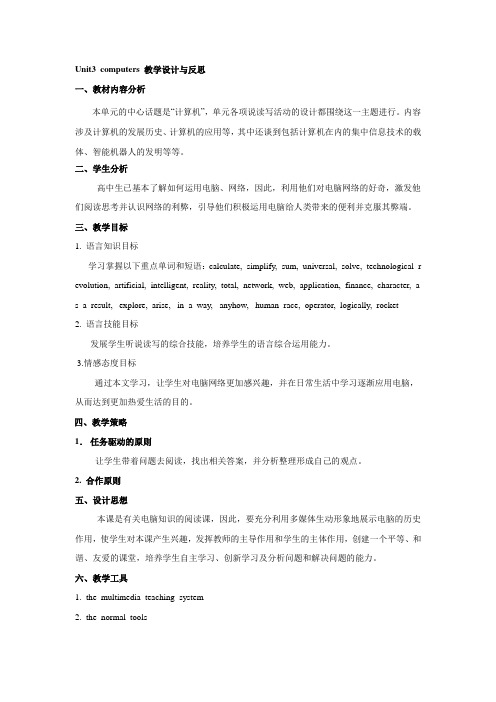
Unit3 computers 教学设计与反思一、教材内容分析本单元的中心话题是“计算机”,单元各项说读写活动的设计都围绕这一主题进行。
内容涉及计算机的发展历史、计算机的应用等,其中还谈到包括计算机在内的集中信息技术的载体、智能机器人的发明等等。
二、学生分析高中生已基本了解如何运用电脑、网络,因此,利用他们对电脑网络的好奇,激发他们阅读思考并认识网络的利弊,引导他们积极运用电脑给人类带来的便利并克服其弊端。
三、教学目标1. 语言知识目标学习掌握以下重点单词和短语:calculate, simplify, sum, universal, solve, technological r evolution, artificial, intelligent, reality, total, network, web, application, finance, character, a s a result, explore, arise, in a way, anyhow, human race, operator, logically, rocket2. 语言技能目标发展学生听说读写的综合技能,培养学生的语言综合运用能力。
3.情感态度目标通过本文学习,让学生对电脑网络更加感兴趣,并在日常生活中学习逐渐应用电脑,从而达到更加热爱生活的目的。
四、教学策略1.任务驱动的原则让学生带着问题去阅读,找出相关答案,并分析整理形成自己的观点。
2. 合作原则五、设计思想本课是有关电脑知识的阅读课,因此,要充分利用多媒体生动形象地展示电脑的历史作用,使学生对本课产生兴趣,发挥教师的主导作用和学生的主体作用,创建一个平等、和谐、友爱的课堂,培养学生自主学习、创新学习及分析问题和解决问题的能力。
六、教学工具1. the multimedia teaching system2. the normal tools七、Teaching procedures:教学过程:StepⅠLead-inAsk the students to say some usages in our daily life and something they know abo ut computer. Then let them look at the pictures on page 18 and the title of the text and predict what the text might be about. Let them give their opinions.StepⅡFast reading1. Find the words for each of the following meanings from the text.—to make things easy (simplify)—to find the answer using numbers(calculate)—can be moved easily from place to place(mobile)—anyway(anyhow)—activity of managing money (finance)—to work out the answer to a problem (solve)—completely (totally)—connected computer system (network)2. Finish the timeline below.1642: The computer began as a calculating machine.1822: The Analytical Machine was made by Charles Babbage.1936: The computer grew rapidly both in size and in brainpower.1940s: The computer had grown as large as a room.Step ⅢCareful reading1. Let the students read the text carefully and then finish the following exercises.①In the first paragraph,“simple-minded” means ___.(B)A. cleverB. stupidC. kindD. good-looking②The computer developed from ___ to ___ and then, it becomes ___. (C)A. big, large, hugeB. huge, big, smallC. not very big, very large, smallD. very large, not very large, small③It can be inferred that ___. (C)A. the computer may be as clever as human beingsB. the computer may be clever than human beingsC. the computer will play a more important role in serving the human beingsD. the computer will take the place of human beings some day④At that time it was considered a technological revolution and the start of my “art ificial intelligence”. The underlined word means ___.(D)A. naturalB. mathematicalC. cleverD. man-made2. Match each paragraph with their topic sentences.Paragraph 1 A My memory improved.Paragraph 2 B Since the 1970s many new applications have been found for me.Paragraph 3 C I began as a calculating machine in 1642 in France.1-C; 2-A; 3-B[设计说明] 本设计旨在提高学生的概括能力,并降低难度,提高学生的学习兴趣。
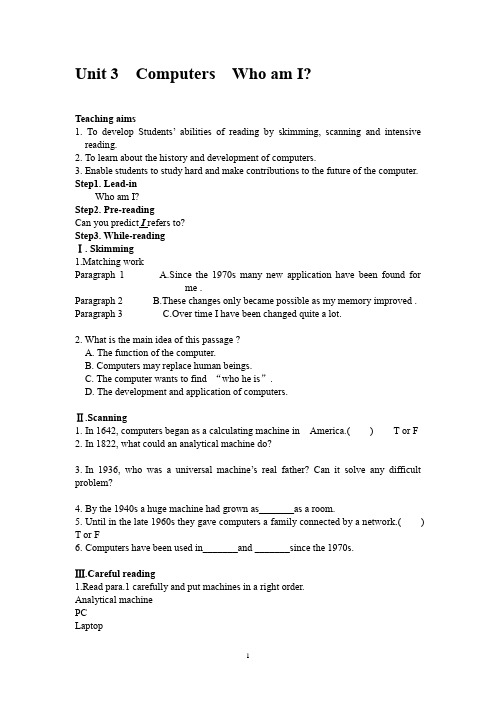
Unit 3 Computers Who am I?Teaching aims1.To develop Students’ abilities of reading by skimming, scanning and intensive reading.2.To learn about the history and development of computers.3. Enable students to study hard and make contributions to the future of the computer. Step1. Lead-inWho am I?Step2. Pre-readingCan you predict I refers to?Step3. While-readingⅠ. Skimming1.Matching workParagraph 1 A.Since the 1970s many new application have been found forme .Paragraph 2 B.These changes only became possible as my memory improved . Paragraph 3 C.Over time I have been changed quite a lot.2. What is the main idea of this passage ?A. The function of the computer.B. Computers may replace human beings.C. The computer wants to find “who he is”.D. The development and application of computers.Ⅱ.Scanning1.In 1642, computers began as a calculating machine in America.( ) T or F2.In 1822, what could an analytical machine do?3.In 1936, who was a universal machine’s real father? Can it solve any difficult problem?4.By the 1940s a huge machine had grown as_______as a room.5.Until in the late 1960s they gave computers a family connected by a network.( ) T or Fputers have been used in_______and _______since the 1970s.Ⅲ.Careful reading1.Read para.1 carefully and put machines in a right order.Analytical machinePCLaptopCalculating machineUniversal machine2.Read Para.2 carefully and answer the question.How did my memory change?3.Read Para.3 carefully and answer the question.Where can computers be used ?4.According to the passage, In what order is the passage organized?Step 4 Post-readingI began as a ___________ machine in 1642 in France and I could _______ difficult sums. In 1822 I was_______ as an analytical machine by Charles Babbage. Then in 1936, Alan Turing wrote a book and built a _________ machine. From then ______, I grew rapidly in size and brainpower. By the 1940s, I had grown as large as a room.As time went________, I was made ______ but my memory got larger. In the 1960s, they gave me a family connected by a _________ , which is called the Internet. Since the 1970s many new____________ have been found for me and I have been used in homes and offices.Now I am truly filled with _________ that I can serve the human race.Step 5 Group workDesign your future computer, then introduce it to the class.1)Choose from the topics: name, birthplace, size, function, power, memory, newapplications, relation with humans, etc. (If possible, draw a picture of it.)2)Use the first person.3)About 100 words.I’m the future computer and my name is…Step 6 Homework1.Try to retell the passage.2. Write a short composition which briefly introduces your future computer. (Write in the first person.About 100words.)Proverbs:Where there is a will, there is a way.有志者,事竟成。
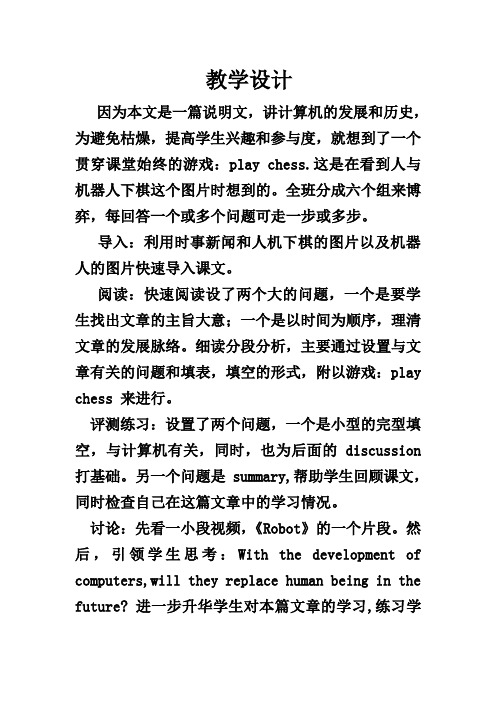
教学设计因为本文是一篇说明文,讲计算机的发展和历史,为避免枯燥,提高学生兴趣和参与度,就想到了一个贯穿课堂始终的游戏:play chess.这是在看到人与机器人下棋这个图片时想到的。
全班分成六个组来博弈,每回答一个或多个问题可走一步或多步。
导入:利用时事新闻和人机下棋的图片以及机器人的图片快速导入课文。
阅读:快速阅读设了两个大的问题,一个是要学生找出文章的主旨大意;一个是以时间为顺序,理清文章的发展脉络。
细读分段分析,主要通过设置与文章有关的问题和填表,填空的形式,附以游戏:play chess 来进行。
评测练习:设置了两个问题,一个是小型的完型填空,与计算机有关,同时,也为后面的discussion 打基础。
另一个问题是summary,帮助学生回顾课文,同时检查自己在这篇文章中的学习情况。
讨论:先看一小段视频,《Robot》的一个片段。
然后,引领学生思考:With the development of computers,will they replace human being in the future? 进一步升华学生对本篇文章的学习,练习学生的表达能力和小组协作能力,增加学生的参与感。
作业:设置了一篇写作,介绍一个叫Allen的机器人,同时也是对课堂讨论的进一步思考。
学情分析我们是一所县级中学,学生的英语水平普遍不高。
学生压力大,学习策略和方法较为死板,习惯于题海战术,喜欢上课认真听老师讲课,较少主动的参与。
所以,应想方设法激发学生的兴趣,使其主动融进课堂学习。
效果分析Summary 和Cloze test 属于客观性题目,且与所学课文内容有关,学生表现积极,效果良好。
Discussion属于主观性题目,输出性较强,有些学生表现很好,积极参与,积极发言,而且思维清晰,条理清楚,能明确表达出自己的观点;有的学生可能在小组里讨论的很好,但却不敢站起来发言,或是汉语知道怎么说,英语却不会表达。
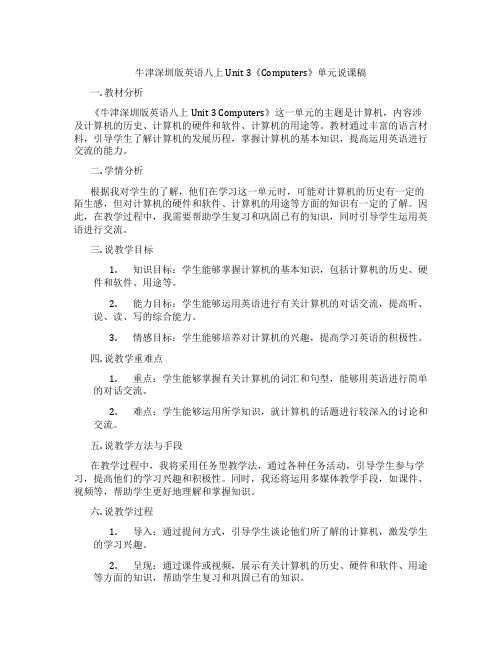
牛津深圳版英语八上Unit 3《Computers》单元说课稿一. 教材分析《牛津深圳版英语八上Unit 3 Computers》这一单元的主题是计算机,内容涉及计算机的历史、计算机的硬件和软件、计算机的用途等。
教材通过丰富的语言材料,引导学生了解计算机的发展历程,掌握计算机的基本知识,提高运用英语进行交流的能力。
二. 学情分析根据我对学生的了解,他们在学习这一单元时,可能对计算机的历史有一定的陌生感,但对计算机的硬件和软件、计算机的用途等方面的知识有一定的了解。
因此,在教学过程中,我需要帮助学生复习和巩固已有的知识,同时引导学生运用英语进行交流。
三. 说教学目标1.知识目标:学生能够掌握计算机的基本知识,包括计算机的历史、硬件和软件、用途等。
2.能力目标:学生能够运用英语进行有关计算机的对话交流,提高听、说、读、写的综合能力。
3.情感目标:学生能够培养对计算机的兴趣,提高学习英语的积极性。
四. 说教学重难点1.重点:学生能够掌握有关计算机的词汇和句型,能够用英语进行简单的对话交流。
2.难点:学生能够运用所学知识,就计算机的话题进行较深入的讨论和交流。
五. 说教学方法与手段在教学过程中,我将采用任务型教学法,通过各种任务活动,引导学生参与学习,提高他们的学习兴趣和积极性。
同时,我还将运用多媒体教学手段,如课件、视频等,帮助学生更好地理解和掌握知识。
六. 说教学过程1.导入:通过提问方式,引导学生谈论他们所了解的计算机,激发学生的学习兴趣。
2.呈现:通过课件或视频,展示有关计算机的历史、硬件和软件、用途等方面的知识,帮助学生复习和巩固已有的知识。
3.实践:学生分组进行讨论,用英语讨论计算机的用途和他们的计算机使用经历,引导学生运用英语进行交流。
4.输出:学生进行角色扮演,模拟计算机店的情景,运用所学知识进行对话交流。
5.复习:通过各种练习活动,帮助学生巩固所学知识。
七. 说板书设计板书设计将包括课题《Computers》、本节课的主要词汇和句型,以及课堂活动的步骤和任务。
Unit3Computers课文知识点详解Unit 3 Computers1.in common 共同的;共有的2.work out 解决;作出pare A with B 把A与B相比较compare A to B 把A比作BWe must compare the present with the past.我们要把现在和过去比较一下。
The poet compares his lover to a rose in his poems.诗人在他诗歌中把他的情人比作玫瑰花。
compare notes with sb.与某人交换看法(或意见等)4.Although=though换成as引导:形容词/分词/名词/副词/实义动词提前5. before(1)在……以前e.g. He had left before I arrived.换成5分钟以前:(2)常用结构:It will be + 时间+ before +从句多久之后才……It will not be + 时间+ before +从句没过多久就会……e.g. It will be three years before we meet again.It will not be long before we meet again.(3)(不久)就;还没来得及……就……常见结构:It was(wasn’t) + 时间+ before + 从句e.g. It wasn’t long before he returned from abroad.5.consider sb. /sth. to be /assth."认为某人是"consider doing 考虑We consider this matter to be very important.我们认为这件事很重要I am considering going or not.我正在考虑去不去6. solve 解答;解决6. from…onfrom then/that time on从那时起from now on从现在起from…(时间/地点)to…(从...到...)from morning to night7. reality8.as time went by=with time______ ___9.First ...,then... and later...10. goal n.(1)目标;目的e.g. Goals determine what you are going to be.(2)进球;得分e.g. get/make a goal(3)球门e.g. keep goal 守球门my goal/dream/plan is to 我的...是11.provide…with…e.g. They provided food and clothing for the homeless.provide sb. with sth. = provide sth. to/for sb.e.g. The sun provides us with light and heat.provide against provide for sb.辨析:13.downloadupload上传search engine搜索引擎log on/in登录,上线log off/out注销,下线chat room聊天室click点击14. in realityin fact in actual fact as a matter of fact15. give away(1)捐赠,赠送,分送e.g. He gave away most of his money to the charity.(2)分发,颁发e.g. The headmaster gave away the prizes at the school sports day.(3)泄漏,暴露e.g. give away the secrets(4)丧失,失去e.g. He gave away his fortunate.16. consistconsist of 由……组成consist in 在于consist with 与……一致e.g. Our team consists of 11 members.Happiness consists in health.由……组成用被动语态:be made up of be composed of用主动语态:consist of17. advantage(1)优势,有点e.g. I had the advantage of him.(=I was in a better position than he was.)(2)利益,好处e.g. There will be no advantage in doing….take advantage of利用be of advantage to对……有利to the advantage of sb.对某人有利辨析:18. in a way = in one wayon the way by the way in the way19. make up(1)编排e.g. He made up the name list.(2)由……组成,构成be made up of(3)编造,捏造e.g. The whole story is made up.(4)凑足,补足或补齐某事物e.g. We need 10,000 dollars to make up the sum required.(5)弥补;补考e.g. She’ll make up the final exa m.(6)化妆e.g. She took over an hour to make up.(7)铺床,支起(临时的床)e.g. They made up a bed on the floor.(8)与某人和解、和好e.g. They quarreled but soon made up.American Indians ____ about five percent of the U.S. population.(2008 浙江)A. fill upB. bring upC. make upD. set up20. after allat all after all above all in allWhy are you so anxious? It isn’t your problem after all.(毕竟这不是你的问题)(after all)21.deal with 对待;对付;处理;与……交易;论述;涉及e.g. This book deals with an important issue.辨析:22. watch over看管;照顾;看守;守卫watch out注意,留神keep a watch on监视on the watch for看守,监视set a watch on派兵守卫23. spoil v. & n.(1)v. 破坏;搞坏;糟蹋;毁掉e.g. Our camping trip was spoilt by bad weather.(2)v. 溺爱,娇惯,宠坏e.g. She spoiled her child.(3)v. 善待,格外关照e.g. spoil oneself(4)v. (食物)变坏、变质e.g. Don’t eat the food because it spoiled.(5)n. [pl.]战利品,掠夺物;成功带来的好处e.g. The robbers divided up the spoils.。
本单元为科技类说明文,为高考阅读理解重要题材。
在高考中占有重要地位。
本堂课是阅读课,为了训练和提高学生的阅读技能,在教学过程中采用任务型语言教学法。
采取的任务由浅入深,由易到难,步步推进从而实现学生阅读的目的。
本节课以任务推动学习,以任务贯穿学习。
课堂活动由听、说、读、写4种语言展现形式组成一个个小任务,形成任务串,前后环环相扣,达到理解课文、用自己的语言重新诠释课文的目的。
学生对电脑并不陌生,日常中也经常接触电脑,因此此话题为学生熟悉话题,阅读上不会有太大障碍。
学生整体英语水平不是太高,因此会导致阅读中出现卡壳现象,阅读设计的难度不要太大,同时再设计中要考虑给学生帮助。
如小组合作可以帮助学生解决大部分困难。
文本中出现的专业术语较多,因此需要学生提前预习充分。
小组内差异较大,需要在教学中予以指导。
1. Put them in an order according to the time.( ) analytical machine ( ) laptop ( ) calculating machine( ) robot ( ) PC ( ) universal machine 2. Fill in the cloze:今天听了当老师的一节课,必修二unit3 computers。
上课环节流畅,内容衔接得当。
导入采用生活中的事物和常见的缩略语,如WWW,PC,IT,telephone,washing machine等,一下子调动了学生的积极性和兴趣。
虽然当今电脑很常见,但是这些词的完整形式却并非人人都会。
此意调动了学生的积极性,一下子拉近了课堂的距离。
接下来的阅读采用渐进式阅读教学策略,通过快速阅读,获取文章的基本信息点,让学生有一个大概的了解,为下一步细节阅读中的迅速定位打下了基础。
通过讨论的方式让学生交换思想,既避免了阅读课的枯燥,又能锻炼学生的交流能力,同时对于基础较弱的学生来说也是一个促进。
必修2 Unit 3 Computers根底操练Ⅰ. 单词拼写1. I (简直,确定) can’t go such stupid behaviour.2. I have c that there are 10, 080 minutes in a week.3. The army officers led a r against the king.4. Now students are in need of good (科技的) books badly.5. Use your (聪明才智), and you’re sure to achieve something.6. P , I think he is dishonest, but many people trust him.7. I’m afraid that your way of doing the job is (完全地) wrong.8. The principal’s a at the party didn’t seem to be very welcome.9. The new buildings have changed the (特点) of the village.10. The railway (信号) showed that the train could pass.Ⅱ. 用方框内所给单词或短语的适当形式填空1. We hoped that a new spirit of freedom was .2. We’ve a beautiful new house from an old ruin.3. I with you on this point.4. Three years before they knew that all their belongings were gone.5. The boy a story; it was not true.Ⅲ. 完成句子1. 这些机器已经被做得越来越小了。
《Computers》说课稿尊敬的各位评委、老师:大家好!今天我说课的内容是《Computers》。
下面我将从教材分析、学情分析、教学目标、教学重难点、教学方法、教学过程以及教学反思这几个方面来展开我的说课。
一、教材分析本次课所选用的教材是_____出版社出版的《_____》。
本单元的主题是“Computers”,主要围绕计算机的发展、类型、功能以及对人们生活的影响等方面展开。
这一主题与我们的日常生活息息相关,能够激发学生的学习兴趣,同时也有助于培养学生的信息技术素养和综合语言运用能力。
本单元的阅读文本是一篇介绍计算机发展历程的文章,语言简洁明了,结构清晰,为学生提供了丰富的语言输入和知识信息。
通过对这篇文章的学习,学生不仅能够了解计算机的发展历史,还能够学习到一些与科技相关的词汇和表达方式。
二、学情分析本次授课的对象是_____年级的学生。
他们已经具备了一定的英语基础,能够用简单的英语进行交流和表达。
然而,在科技类话题方面,他们可能缺乏相关的词汇和背景知识,对于一些复杂的句子结构和长难句的理解可能会存在一定的困难。
此外,这个年龄段的学生思维活跃,好奇心强,喜欢新鲜事物。
因此,在教学过程中,我将充分利用多媒体等教学手段,激发学生的学习兴趣,提高他们的学习积极性和主动性。
三、教学目标基于对教材和学情的分析,我制定了以下教学目标:1、知识目标(1)学生能够掌握与计算机相关的词汇,如“computer”“laptop”“desktop”“processor”“memory”等。
(2)学生能够理解并正确运用关于计算机发展历程和功能的表达方式,如“The first computer was invented in the 1940s” “Computers have become an indispensable part of our lives”2、技能目标(1)通过阅读训练,提高学生的阅读理解能力,培养学生快速获取信息、归纳总结和推理判断的能力。
Unit3 Computers - Reading: Who AM I 课文分析1. Over time I have been changed quite a lot. I began as a calculating machine in France in 1642.over : _____________________ 计算机:_____________________2. Although I was young I could simplify difficult sums.用( )画出从句, 是_________________从句, 用_______________引导.simplify (1). 词性:______________ (2). 词义:_____________________sum (1). 词性:______________ (2). 词义:_____________________in sum: _____________________ sum up: _________________________3. I developed very slowly and it took nearly two hundred years before I was built as an analytical machine by Charles Babbage.(1)an analytical machine _______________________(2). It was/ took + 段时间+ before .... ____________从句常用____________时态_It will take/be long (或一段时间) before..._____________________从句常用_______ _______时态翻译句子:(1)过了三天他才回来__________________________________________________ (2)要过五年我才能回来________________________________________________ (3)两年后他才得知真相________________________________________________ (4)经济形式要等两年后才会有所好转(economic situation improves)_______________________________________________________________________It was not long (段时间)+ before....______________________________It won't be long (段时间) + before...._______________________________(1)不久他在公司就升了职(get a rise)_______________________________________________________________ (2)用不了多久我们就会习惯新的学校(be used to +n/ ving )_______________________________________________________________翻译句子并总结句型,并注意从句时态It is / has been ten years since he left Beijing.It is / has been ten years since he was a doctor.It was 8 o'clock when he came back.It will be midday when they get home.(3). It is/ has been +段时间+ since… _____________________________________It will be/ was + 具体时间点+ when、、、____________________________________ It is/ was + 时间状语+ that 、、、______________________________________用 A. before B. when C. since D. that填空1. It was two years ________he realized the truth.2. It will be two years ________ the economic situation improves.3. It was two years later ________ he realized the truth.4. It is /has been two years ________ he lived here.5. It was midnight ________ he arrived home.6. It was at midnight ________ he arrived home.7. It was not until midnight _______ he arrived home.4. After I was programmed by an operator who used cards with holes, I could "think" logically and produce an answer quicker than any person.用( ) 画出从句, 是_____________ 从句,引导词是_________和________________从句, 引导词是____________在从句中作_______________成分.programme: ______________________ operator: _________________________ logically: __________________________5. At that time it was considered a technological revolution and the start of my "artificial intelligence".at that time: ____________________技术革命: ______________________ 人工智能: __________________________6. In 1936 my real father, Alan Turing, wrote a book about how I could be made to work asa "universal machine" to solve any difficult mathematical problem.划线部分做___________________成分.我认为这个问题不难解决.I think _____________________________________________________.当夜幕降临时, 他们找了间小房间住宿When evening came ____________________________________________solve: ____________________ 名词形式:________________________ .......的解决办法:___________________________________7. From then on, I grew rapidly both in size and in brainpower.from then on ____________________from... on...._____________________从现在起: _______________________ 从明天起: ___________________________ brainpower: _____________________-8. By the 1940s I had grown as large as a room, and I wondered if I would grow any larger. However, this reality also worried my designers.修饰比较级的词和短语,你能写出几个: _______________________________________ _________________________________________________________________________ 用( ) 画出从句, 是_______________从句, 从句中缺成份吗?_____________, 缺的是什么?________________9. As time went by, I was made smaller. First as a PC( personal computer) and then as a laptop, I have been used in offices and homes since the 1970s.用( ) 画出从句, 是________________从句, 引导词是_____________.意为“________________”。
也可以用___________替换,但次词后只接名词加宾补随着年龄的增长, 我们会变得更加聪明_________________________________, we will get wiser.随着春天的来临, 天气越来越暖和了_________________________________, it's becoming warmer and warmer.go by: __________________________personal: _______________________性格,个性,人格(n.)________________________就个人而言,亲自:____________________________10. These changes only became possible as my memory improved.用( ) 画出从句, 是________________从句, 引导词是______________11. First it was stored in tubes, then on transistors and later on very small chips. As a result I totally changed my shape. As I have grown older I have also grown smaller. transistor: _____________________as a result: _____________________由于,源于________________________ 结果为,导致:___________________ 徒劳,毫无结果:___________________________完全地,整个地:______________________总数,合计(n.) & 总的,整个的(adj.) ______________________12. Over time my memory has developed so much that, like an elephant, I never forget anything I have been told! And my memory became so large that even I couldn't believe it! so ......that 译为:"_______________________"是________________从句,so是__________词性,修饰_____________词13. But I was always so lonely standing there by myself, until in the early 1960s they gave me a family connected by a network. I was able to share my knowledge with others throughthe World Wide Web.lonely: 词性_______________ 词义:___________________standing there by myself做____________________成分。